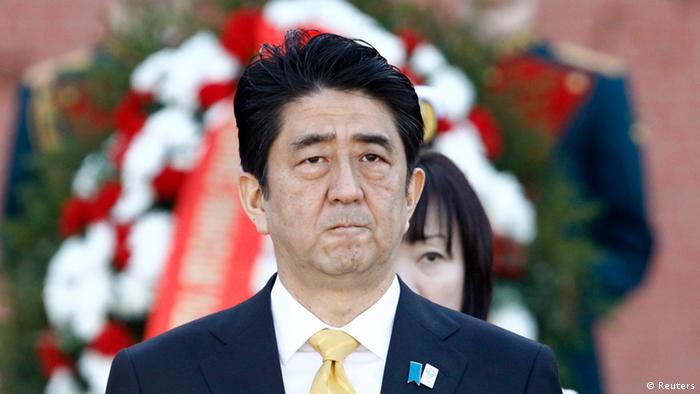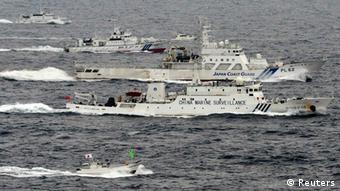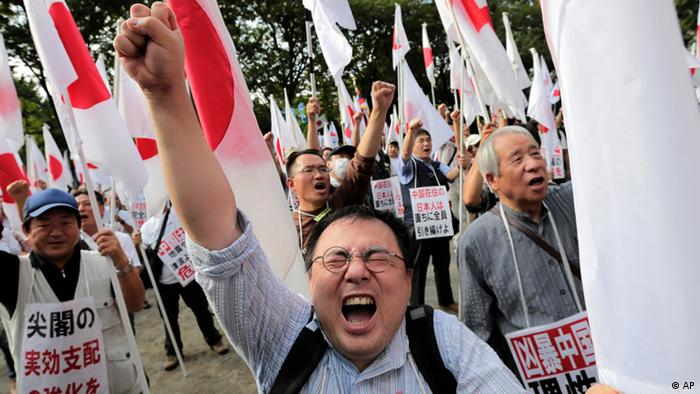Japan's neighbors are getting wary of PM Shinzo Abe and his center-right government. At home, however, Abe is bucking the trend of his immediate predecessors and riding high in the opinion polls.
In public, the Japanese government has kept its counsel about the decision by Park Geun-hye, the new South Korean president, to select Beijing as the location of her first diplomatic mission within Asia. In private, Japan's leader must be displeased at what is a clear put down.
But it should not be a complete surprise to Prime Minister Shinzo Abe, given the chilly relationship that Japan has at present with its immediate neighbors - China, South Korea, North Korea and, to a lesser extent, Taiwan and Russia.
In opting to travel to Beijing to meet China's leaders ahead of a visit to Tokyo, Park has deliberately broken with the tradition set by the previous four South Korean presidents since Seoul normalized its diplomatic relations with China in 1992. It also suggests where she sees her nation's economic future and, potentially, its security.
The months since Park was sworn into office in Seoul in February have been marked by an increasingly irritable and awkward relationship with Tokyo.
Disdain for Japan
The key issues behind South Korea's apparently growing disdain for Japan are the territorial row over the Dokdo islets between the two nations, which Japan claims as its territory. The islets are protected by a detachment of armed South Korean police. Furthermore, the South criticizes Japan for its failure to admit responsibility for thousands of women forced into sexual slavery for the Japanese military in the early decades of the last century.
The South Korean media is missing no opportunity to berate Japan, with shrill editorials in newspapers this week insisting that Abe had set out to offend by being photographed sitting in the cockpit of a military trainer jet with the number 731 stenciled on the side. Unit 731 was a military unit that carried out horrific experiments on civilians in parts of occupied Asia during World War II.
"It is clear that President Park is putting priority on China over Japan and this is definitely a snub to Abe," Jun Okumura, an international relations analyst with the Eurasia Group, told DW. "I think Prime Minister Abe and members of his administration who share his way of thinking would be very angry. But I also think they are resigned to the likelihood that South Korea is just going to continue to behave in this fashion."
Jun says that South Korea wants nothing short of complete capitulation on the issue of history. He points out that previous administrations have sought to draw a line under the question of the so-called "comfort women," but have been rebuffed.
"There is no way that a Japanese government will be able to satisfy South Korea on this issue, so I think politicians here have reached the conclusion 'so be it'," he said.
It is a similar story with Beijing, with whom Tokyo is locked in a bitter war of words over the sovereignty of the uninhabited Senkaku Islands, which Tokyo controls but which China knows as the Diaoyu Islands and claims as its territory.
Tensions around the disputed islands continue to rise, with an unidentified submarine being recently detected by the Japanese military close to Japanese territorial waters. The assumption is that it was Chinese and that it was testing Japanese defenses.
Beijing equally takes issue with Japan's interpretation of history - the "comfort women" and the way in which history is taught in Japanese schools. The glossing over of Japan's brutal invasion and occupation of much of eastern Asia in the early twentieth century is decried as "revisionism" in China.
Domestic success
At home, however, Abe is faring well in the public opinion polls and the his center-right Liberal Democratic Party (LDP) is apparently on course to record a second successive solid victory in the election for the upper house of the Japanese parliament in July.
In recent polls, Abe's approval ratings have ranged between 66 percent and 76 percent. Other polls suggest that the LDP has a support rate of 36 percent of the voting public as the election draws closer. The party's closest rival, the Democratic Party of Japan, has a mere 10 percent.
The public is apparently impressed with what Abe has achieved at home in the relatively short time since he was elected in December.
"In terms of domestic policy, I am somewhat surprised that he has done as much as he has," Professor Ian Neary, director of the Nissan Institute of Japanese Studies at the University of Oxford, told DW. "We might have predicted that he would have been cautious between his election and the House of Councillors election in July for fear of disrupting the support of the electorate."
Conventional wisdom would have suggested that he would focus almost exclusively on getting the economy back on track through his "Abenomics" plans.
That has not been the case, however, with Abe tackling a long list of policy proposals, ranging from rewriting the constitution to joining the Trans-Pacific Partnership discussions.
"The cabinet has been much more successful in the opinion polls and PM Abe has clearly felt confident that he could address these other issues as well," Neary said.
Abe has also apparently learned his lesson from his first - albeit abbreviated - time as prime minister. Shortly after being elected in September 2006, he attempted to push through revisions to the constitution too quickly and without sufficient support in parliament or in the nation as a whole.
Frustrated, he stepped down less than one year after becoming the prime minister.
This time, Abe appears to have built a solid support base in both political circles and Japanese society. It appears he will be able to retain his title far longer this time and will almost certainly be able to push through major changes.
That will be welcomed at home, but is likely to provoke further antagonism overseas. DW DE



Comments